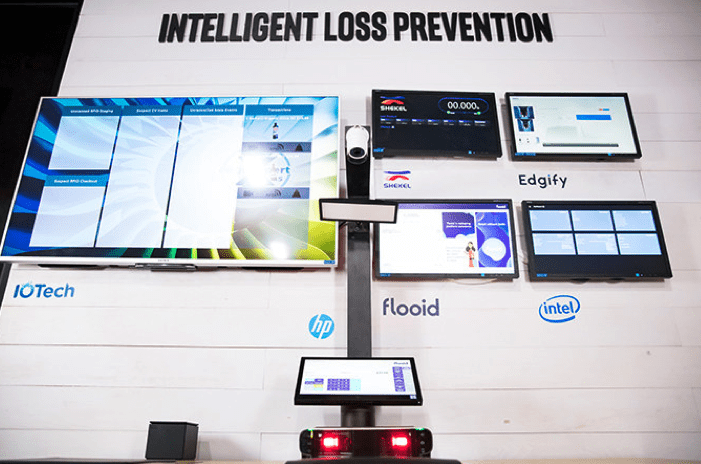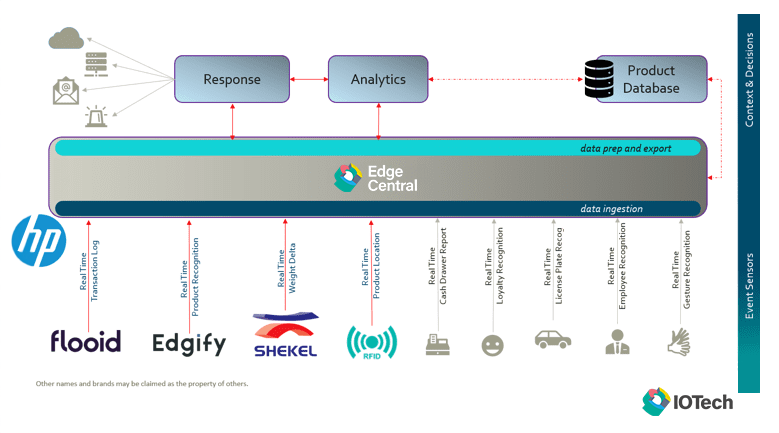Intel: Intelligent Loss Prevention in Retail
Industry:
Retail
Use Case:
Loss detection in real time for self-checkout at point of sale for grocery or convenience stores. A loss prevention software application was created using EdgeX Foundry to combine POS, RFID, Weight Scale and Computer Vision data all in a single pane of glass and use it to alert associates in real time. This demo showcases how to take advantage of data from sensors currently available in stores to create a better solution compared to using a single sensor (i.e. weight scale).
Written by Kristen Call and Camilo Dennis, Intel Open Retail Initiative, LF Edge members, and EdgeX Foundry contributors
ORI: Technology Collaboration to drive innovation in Smart Retail
Intel announced the Open Retail Initiative (ORI) last year at the National Retail Federation tradeshow. ORI is a collaborative effort led by LF Edge member Intel and top technology companies who believe that open, accessible edge software solutions will accelerate iteration, flexibility, and innovation at scale. To empower digital transformation in smart retail, ORI promotes EdgeX Foundry as a common, open framework to allow retailers to access edge data across applications, removing silos and unlocking insights that improve services and experiences. To learn more about ORI visit http://bit.ly/Intel-OpenRetail.
For the one-year anniversary of ORI, six initiative members Edgify, Flooid, Shekel, and LF Edge members HP, IOTech, and Intel inspired by the initiative, worked together on a demo for the Intel booth that showcased the value of real-time Sensor Fusion for a loss prevention use case at self-checkout. The retail environment has become incredibly complex. The latest technologies enable data-driven experiences and unlock business value like never before, yet there is still a lack of interoperability making it difficult for retailers to deploy integrated solutions with speed and ease. The demo illustrates how integration roadblocks can be a thing of the past.
The demo pulls together real-time data through the EdgeX middleware from different common systems including POS real-time transaction log, CV-based object detection, scale solution, and RFID, and data fusion—all in a single pane of glass.

NRF 2020: Intelligent Loss Prevention – A collaboration of six partners, inspired by the spirit of Intel’s Open Retail Initiative (ORI), the demo showcased Real-Time Sensor Fusion (RTSF) using EdgeX open source middleware to combine POS, RFID, Scale, and Computer Vision data —all in a single pane of glass.
Liberate your data using EdgeX Foundry
Much of the data created in physical retail today, i.e. at brick and mortar, is not used or a portion of it is aggregated to be used later. Edge data is usually trapped in silos which makes it difficult for retailers and technology integrators to merge and use data, especially in real-time. Innovation is hampered because of:
- Environmental complexity due to lack of interoperability
- Deployment of data-driven experiences in brick and mortar is limited or not possible with traditional architecture
- Lack of unified standards impeding digital transformation efforts
Intelligent Loss prevention is just the beginning, Intel and its partners used this demo to demonstrate what’s possible when a community works together and uses open standards to solve today’s real retail problems: EdgeX Foundry edge software architecture allows access to data across applications in real-time allowing retailers and technology vendors to unlock insights that improve services and experiences. All this is possible by augmenting common existing assets, rather than rip and replace.

Using real-time sensor fusion to solve a retail problem - Proof of Concept
Retailers increasing self-checkout for customer convenience continue to face challenges to detect and prevent theft. No single sensor, i.e. RFID or scale, is theft-proof at self-checkout. That said, combining different sensors, each with unique detection attributes can improve object detection and reconciliation accuracy. The tradeoff though, in traditional architecture, is a complex integration effort among sensors and the Point of Sale solution. When using a loss prevention software based on a modern architecture, a community approach, and open standards integration, then complexity becomes a thing of the past.
The POC combined data from RFID, Scale, and CV POS RTTL to determine if an item had been scanned or not. RFID was Intel-based open solutions RSP. The discrepancy was displayed differently showcasing how the data could be reutilized based on the end users' preferences without a large effort. For detailed information on the reference design used for sensor fusion for loss detection at self-checkout, including the use of machine learning to connect point-of-sale systems, weight scale sensors, cameras, and RFIDs to accurately detect checkout items visit https://software.intel.com/en-us/iot/reference-implementations/point-of-sale-loss-prevention
Reduce development and integration time to focus on value add
Back to the caveat of having to integrate with a point of sale solution for the loss prevention use case and the challenges mentioned earlier from lack of interoperability and data silos and how to tackle them. After the POC described above, Intel, fellow ORI members and the EdgeX community collaborated to create an NRF demo using enterprise ready applications.
According to Flooid (formerly PCMS) a traditional integration with a POS solution can take 6 months vs. the weeks the demo team had to work on this demo which was only possible by:
- Use of edge data and protocol standards and EdgeX middleware
- The EdgeX-based architecture allowed partners to focus on their own application and contribution to the use case and not on integration
- Reusable components from the EdgeX community. i.e. the weight scale device service
- Minimal impact on the participating applications, but it's noteworthy to say the complexity of managing each application did not change
The entire demo took 3 months. The speed of integration took 2 hours to 2 weeks for each vendor. Flooid was able to integrate with EdgeX's open-edge architecture in just a couple of hours. It took a couple of weeks for all the other applications to integrate into EdgeX and a 5-day onsite meetup to bring it all together. The remaining 2 months were dedicated to hardening the solution and for each vendor to work on nuances for the physical sensor and to tune their specific application requirements. Finally, each application provider focused on their area of expertise, i.e. POS did not have to be a CV or RFID expert and vice versa. As a result, a System Integrator and or the POS provider can focus on new use cases to build business value while reducing the integration effort and risk.

Architecture provided by IOTech
Call to Action
Commit to the initiative and join ORI, let us know if you have a use case that you’d like to work together on. Collaborate on the EdgeX Vertical Solutions Working Group. Contribute to the EdgeX Foundry project or influence standards by becoming an LF Edge member and sharing implementation stories such as these.
For more about EdgeX Foundry’s Journey in smart retail, check out this video: